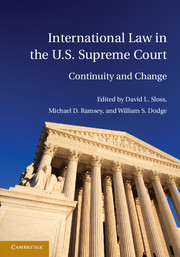Book contents
- Frontmatter
- Contents
- List of Contributors
- Table of Cases
- Acknowledgments
- Introduction
- PART I FROM THE FOUNDING TO THE CIVIL WAR
- PART II FROM THE CIVIL WAR TO THE TURN OF THE CENTURY
- PART III FROM THE TURN OF THE CENTURY TO WORLD WAR II
- PART IV FROM WORLD WAR II TO THE NEW MILLENNIUM
- 10 Treaties in the Supreme Court, 1946–2000
- 11 Customary International Law in the Supreme Court, 1946–2000
- 12 International Law as an Interpretive Tool in the Supreme Court, 1946–2000
- 13 Global Power in an Age of Rights: Historical Commentary, 1946–2000
- PART V INTERNATIONAL LAW IN THE U.S. SUPREME COURT IN THE TWENTY-FIRST CENTURY
- V.A TREATIES AFTER 2000
- V.B CUSTOMARY INTERNATIONAL LAW AFTER 2000
- V.C INTERNATIONAL LAW AND CONSTITUTIONAL INTERPRETATION AFTER 2000
- V.D INTERNATIONAL LAW AND STATUTORY INTERPRETATION AFTER 2000
- V.E INTERNATIONAL LAW AND THE WAR ON TERROR
- VI CONCLUSION
- Index
- References
12 - International Law as an Interpretive Tool in the Supreme Court, 1946–2000
Published online by Cambridge University Press: 05 July 2011
- Frontmatter
- Contents
- List of Contributors
- Table of Cases
- Acknowledgments
- Introduction
- PART I FROM THE FOUNDING TO THE CIVIL WAR
- PART II FROM THE CIVIL WAR TO THE TURN OF THE CENTURY
- PART III FROM THE TURN OF THE CENTURY TO WORLD WAR II
- PART IV FROM WORLD WAR II TO THE NEW MILLENNIUM
- 10 Treaties in the Supreme Court, 1946–2000
- 11 Customary International Law in the Supreme Court, 1946–2000
- 12 International Law as an Interpretive Tool in the Supreme Court, 1946–2000
- 13 Global Power in an Age of Rights: Historical Commentary, 1946–2000
- PART V INTERNATIONAL LAW IN THE U.S. SUPREME COURT IN THE TWENTY-FIRST CENTURY
- V.A TREATIES AFTER 2000
- V.B CUSTOMARY INTERNATIONAL LAW AFTER 2000
- V.C INTERNATIONAL LAW AND CONSTITUTIONAL INTERPRETATION AFTER 2000
- V.D INTERNATIONAL LAW AND STATUTORY INTERPRETATION AFTER 2000
- V.E INTERNATIONAL LAW AND THE WAR ON TERROR
- VI CONCLUSION
- Index
- References
Summary
The post–World War II era was a period of both decline and resurgence for international law as an interpretive tool before the Supreme Court. In statutory interpretation, the role of international law remained in a state of flux. The Charming Betsy canon diminished in importance, as courts increasingly relied on the presumption against extraterritoriality to define the extraterritorial reach of federal statutes. The era also brought dramatic changes in the treatment of foreign sovereigns before the Supreme Court. The Foreign Sovereign Immunities Act (FSIA) attempted to depoliticize immunity determinations by removing them from the purview of the Executive and placing them squarely within the jurisdiction of the courts.
The most dramatic developments for international law's role were in constitutional interpretation. International law notions of territorial sovereignty faded from the Court's analysis of jurisdictional questions under the Due Process Clause and were replaced by considerations of fairness and reasonableness. The decline of sovereignty was also evident in the decline of the Court's sovereign powers approach to federal power. However, the period witnessed a surge in the use of international law to interpret individual rights under the Eighth Amendment and other provisions in the Bill of Rights – and in contrast to earlier periods, the use of international law to expand those rights. The era also witnessed the emergence of modern international human rights law in constitutional jurisprudence, as the Court began to rely on new human rights treaties in interpreting the constitutional rights of U.S. citizens.
- Type
- Chapter
- Information
- International Law in the U.S. Supreme Court , pp. 380 - 415Publisher: Cambridge University PressPrint publication year: 2011
References
- 2
- Cited by



